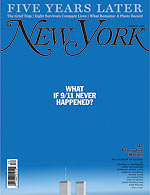“When you look at this tower, it will immediately tell you where the memorial park is. It’s always pointing.” Architects and developers reveal the rest of the proposed Lower Manhattan skyline at Ground Zero, to accompany the Freedom Tower.
Category: War on Terror
Al Liars.
“‘Saddam only expressed negative sentiments about bin Laden,’ the former Iraqi foreign minister, Tariq Aziz, told the Federal Bureau of Investigation when he was asked about Osama bin Laden, Al Qaeda’s leader…’He specified that if he wanted to cooperate with the enemies of the U.S., he would have allied with North Korea or China,’ says a passage in the nearly 400-page report.” A new Senate intelligence report confirms what has become patently obvious: There was no link between Iraq and Al Qaeda before the war. “Sen. Carl Levin, D-Mich., a member of the committee, said the long-awaited report was ‘a devastating indictment of the Bush-Cheney administration’s unrelenting, misleading and deceptive attempts’ to link Saddam to al-Qaida.”
Prison Break.
After fierce debate among the neocons, Dubya comes clean about the CIA’s secret prisons (outed by the Post last November) and moves the detainees held therein to Gitmo. But don’t think this moment of clarity means King George is playing it straight just yet: He’s also asking Congress to sidestep recent court decisions and grant him power to continue wiretapping without warrants and to torture alleged evildoers with impunity. And even moderate Republicans and military lawyers have issues with his recent attempts to deny suspected terrorists due process.
Update: Slate‘s Dahlia Lithwick has more: “The speech teemed with all the rhetorical wizardry you might expect of a do-over. Bush justified torture and extraordinary rendition while denying that they exist. He stuck a fork in the eye of the Supreme Court while agreeing to be bound by the majority’s decision. He conceded that Congress should play a role in creating military tribunals while demanding that it greenlight his plan.“
Just another day in Lower Manhattan.
As the five-year anniversary approaches, New York Magazine wonders “What if 9/11 never happened?”, putting the question to Andrew Sullivan, Thomas Friedman, Dahlia Lithwick, Frank Rich, Tom Wolfe, Doris Kearns Goodwin, Fareed Zakaria, Douglas Brinkley, and others. (By way of Lots of Co.)
Anna and the King.
“[P]ublic interest is clear, in this matter. It is the upholding of the Constitution.” In a strongly worded decision that minces no words about the Dubya administration’s “obviously” unwarranted powergrab, U.S. District Judge Anna Diggs Taylor finds the NSA warrantless wiretaps blatantly unconstitutional. “It was never the intent of the framers to give the president such unfettered control, particularly where his actions blatantly disregard the parameters clearly enumerated in the Bill of Rights…There are no hereditary Kings in America and no powers not created by the Constitution. So all ‘inherent powers’ must derive from that Constitution.” Elsewhere in the opinion, Taylor found that the wiretap program “violates the separation of powers doctrine, the Administrative Procedures Act, the First and Fourth amendments to the United States Constitution, the FISA and Title III.” Update: As per the norm, the GOP try to shoot the messenger.
Towers of Stone.
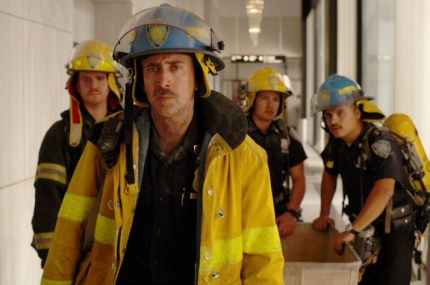 If you’re going to see only one movie about 9/11, see Paul Greengrass’ United 93, far and away the best movie of the year. If you’re going to see two movies about 9/11, see United 93 and Spike Lee’s The 25th Hour, still the best film I’ve seen about the day’s aftermath here in Gotham. And, if you’re going to see three movies about 9/11…hmm, now that’s a tough one. Maybe add the first hour of Steven Spielberg’s War of the Worlds and the first half-hour of Oliver Stone’s surprisingly rote World Trade Center? While much better than the godawful Alexander or the misfiring Any Given Sunday, World Trade Center nevertheless suggests that Stone is still somewhat off his game. The movie has some moments of genuine power, particularly in its first act (as it would have to given the potency of its source material), but it’s hard to believe the director of JFK, Platoon, Natural Born Killers, and Nixon would make such a staid and conventional Lifetime movie-of-the-week from the defining tragedy of our decade. (Even more unStonelike, aside from an indirect dig at the blathering television newsmedia, who continuously recycle the morning’s events well past everyone’s endurance, WTC is also resolutely apolitical and uncontroversial.) In sum, World Trade Center is crisply-made and at times affecting, but nowhere near as interesting or eventful a movie as you might expect. As EW’s Owen Gleiberman aptly summed it up, “World Trade Center isn’t a great Stone film; it’s more like a decent Ron Howard film.“
If you’re going to see only one movie about 9/11, see Paul Greengrass’ United 93, far and away the best movie of the year. If you’re going to see two movies about 9/11, see United 93 and Spike Lee’s The 25th Hour, still the best film I’ve seen about the day’s aftermath here in Gotham. And, if you’re going to see three movies about 9/11…hmm, now that’s a tough one. Maybe add the first hour of Steven Spielberg’s War of the Worlds and the first half-hour of Oliver Stone’s surprisingly rote World Trade Center? While much better than the godawful Alexander or the misfiring Any Given Sunday, World Trade Center nevertheless suggests that Stone is still somewhat off his game. The movie has some moments of genuine power, particularly in its first act (as it would have to given the potency of its source material), but it’s hard to believe the director of JFK, Platoon, Natural Born Killers, and Nixon would make such a staid and conventional Lifetime movie-of-the-week from the defining tragedy of our decade. (Even more unStonelike, aside from an indirect dig at the blathering television newsmedia, who continuously recycle the morning’s events well past everyone’s endurance, WTC is also resolutely apolitical and uncontroversial.) In sum, World Trade Center is crisply-made and at times affecting, but nowhere near as interesting or eventful a movie as you might expect. As EW’s Owen Gleiberman aptly summed it up, “World Trade Center isn’t a great Stone film; it’s more like a decent Ron Howard film.“
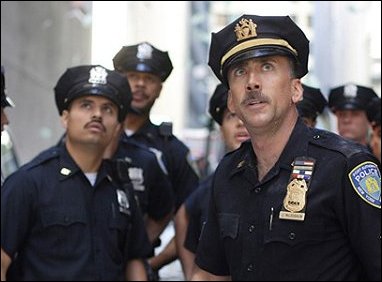 Much like United 93, World Trade Center begins in the wee morning hours of Tuesday, September 11, 2001 (3:29 am, to be exact), as some of New York City’s earliest risers — and, indeed, the City itself — wake up to face another day. Among the bleary-eyed morning commuters are two of the Port Authority’s finest, family men Sgt. John McLoughlin (Nicolas Cage) and rookie officer Will Jimeno (Michael Pena). We follow McLoughlin and Jimeno through the beginnings of their usual routine — walking the beat at the Port Authority bus terminal — until the shadow of a jet zooms overhead, and the horrors of the day start to unfold. An expert on the World Trade Center since before the 1993 bombing, McLoughlin quickly leads a busload of anxious Port Authority cops down to what will soon become known as Ground Zero, where he and a small team (including Jimeno), after choking back their awe and fear, enter the mall concourse between the towers. As metal coughs, creaks, and grinds onimously in the background, these first responders gather up their gear and prepare for their trek up Tower 1. But, just when McLoughlin gets wind that there may be something wrong in Tower 2 (news which Jimeno heard on the way down), a terrible Wrath-of-God rumbling begins, and the World caves in. Having barely made a desperate sprint to the elevator shaft, which McLoughlin — thankfully — had known was the strongest part of the building, the surviving members of his team find themselves entombed (and partially crushed) amid a hellish morass of concrete and twisted steel. Then — although they have no clue what’s going on — the other Tower falls, and McLoughlin and Jimeno are left alone in the dark, hopelessly pinned underneath the smoldering wreckage of the two towers.
Much like United 93, World Trade Center begins in the wee morning hours of Tuesday, September 11, 2001 (3:29 am, to be exact), as some of New York City’s earliest risers — and, indeed, the City itself — wake up to face another day. Among the bleary-eyed morning commuters are two of the Port Authority’s finest, family men Sgt. John McLoughlin (Nicolas Cage) and rookie officer Will Jimeno (Michael Pena). We follow McLoughlin and Jimeno through the beginnings of their usual routine — walking the beat at the Port Authority bus terminal — until the shadow of a jet zooms overhead, and the horrors of the day start to unfold. An expert on the World Trade Center since before the 1993 bombing, McLoughlin quickly leads a busload of anxious Port Authority cops down to what will soon become known as Ground Zero, where he and a small team (including Jimeno), after choking back their awe and fear, enter the mall concourse between the towers. As metal coughs, creaks, and grinds onimously in the background, these first responders gather up their gear and prepare for their trek up Tower 1. But, just when McLoughlin gets wind that there may be something wrong in Tower 2 (news which Jimeno heard on the way down), a terrible Wrath-of-God rumbling begins, and the World caves in. Having barely made a desperate sprint to the elevator shaft, which McLoughlin — thankfully — had known was the strongest part of the building, the surviving members of his team find themselves entombed (and partially crushed) amid a hellish morass of concrete and twisted steel. Then — although they have no clue what’s going on — the other Tower falls, and McLoughlin and Jimeno are left alone in the dark, hopelessly pinned underneath the smoldering wreckage of the two towers.
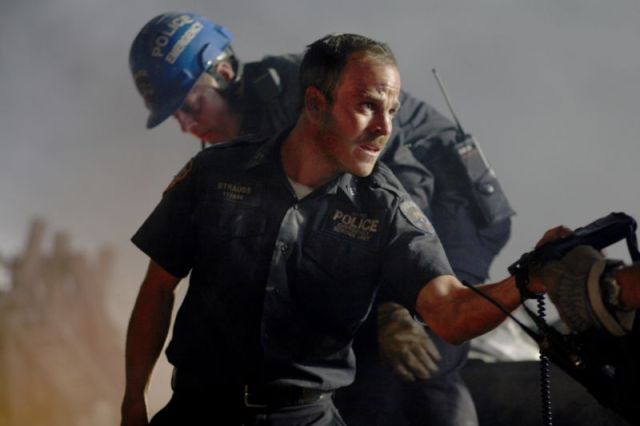 Up to this point, Stone’s movie is almost completely riveting, and the scenes in the doomed (and painstakingly recreated) WTC concourse in particular have a horrifying “I can’t believe I’m seeing this” feel to them…Unfortunately, we’re only about thirty minutes into the film. For the next ninety minutes, WTC switches back and forth between these two dying peace officers and the anxious pacing of their confused and griefsick wives, Donna McLoughlin (Maria Bello, wearing really distracting blue contacts that make her look Fremen) and a pregnant Allison Jimeno (Maggie Gyllenhaal). Alas, horror yields to hokum, and the film pretty much wallows in melodramatic platitudes for the remainder of its run. This is not to say that the rest of World Trade Center is terrible — It’s competently made and, given the human drama at stake here, even moving at times. But it’s also breathtakingly conventional, with Stone (and WTC‘s writer Andrea Berloff) pulling every single disaster-movie-tearjerker cliche out of the book by the end: flashbacks to happier times, ghostly visions of loved ones (as well as a faceless Jesus, which is the closest Stone gets to his usual obligatory shaman cameo), the kid who won’t accept the situation at face value, the musing over last words spoken, etc. (The bromides also extend to the brief and not very realistic characterizations of some of the post-collapse rescuers, which include Stephen Dorff, Frank Whaley, and Michael Shannon.)
Up to this point, Stone’s movie is almost completely riveting, and the scenes in the doomed (and painstakingly recreated) WTC concourse in particular have a horrifying “I can’t believe I’m seeing this” feel to them…Unfortunately, we’re only about thirty minutes into the film. For the next ninety minutes, WTC switches back and forth between these two dying peace officers and the anxious pacing of their confused and griefsick wives, Donna McLoughlin (Maria Bello, wearing really distracting blue contacts that make her look Fremen) and a pregnant Allison Jimeno (Maggie Gyllenhaal). Alas, horror yields to hokum, and the film pretty much wallows in melodramatic platitudes for the remainder of its run. This is not to say that the rest of World Trade Center is terrible — It’s competently made and, given the human drama at stake here, even moving at times. But it’s also breathtakingly conventional, with Stone (and WTC‘s writer Andrea Berloff) pulling every single disaster-movie-tearjerker cliche out of the book by the end: flashbacks to happier times, ghostly visions of loved ones (as well as a faceless Jesus, which is the closest Stone gets to his usual obligatory shaman cameo), the kid who won’t accept the situation at face value, the musing over last words spoken, etc. (The bromides also extend to the brief and not very realistic characterizations of some of the post-collapse rescuers, which include Stephen Dorff, Frank Whaley, and Michael Shannon.)
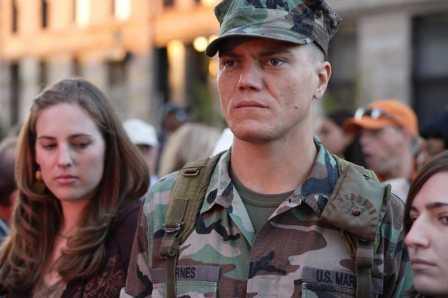 Along those lines, I don’t want to make it sound like I’m criticizing the true story of McLoughlin and Jimeno — their story is a miracle, and one of the few small beacons of cheer from that terrible morning. But, when a movie called World Trade Center ends up focusing so narrowly on these two survivors and — big spoiler, but it’s in the poster — ends with happy reunions and two families getting unexpectedly wonderful news, something seems off. Unlike United 93 which managed to recapture both the primal nightmare and unexpected heroism of that day and did so unblinkingly, without sugar-coating the fate of the fallen, WTC instead transmutes the stark emotions of 9/11 into saccharine, easy-to-swallow caplets of Hollywood sentiment. Some people may like this alchemy better, I suppose, but, in all honesty, to me it felt like an overly-sanitized cop-out (or two cops-out, in this case.) World Trade Center means well and is a decent film in every sense of the word. But the first half-hour notwithstanding, it also feels superfluous — which, given the confluence of director and material here, is somewhat surprising.
Along those lines, I don’t want to make it sound like I’m criticizing the true story of McLoughlin and Jimeno — their story is a miracle, and one of the few small beacons of cheer from that terrible morning. But, when a movie called World Trade Center ends up focusing so narrowly on these two survivors and — big spoiler, but it’s in the poster — ends with happy reunions and two families getting unexpectedly wonderful news, something seems off. Unlike United 93 which managed to recapture both the primal nightmare and unexpected heroism of that day and did so unblinkingly, without sugar-coating the fate of the fallen, WTC instead transmutes the stark emotions of 9/11 into saccharine, easy-to-swallow caplets of Hollywood sentiment. Some people may like this alchemy better, I suppose, but, in all honesty, to me it felt like an overly-sanitized cop-out (or two cops-out, in this case.) World Trade Center means well and is a decent film in every sense of the word. But the first half-hour notwithstanding, it also feels superfluous — which, given the confluence of director and material here, is somewhat surprising.
Terror Firma.
A day after Scotland Yard announces it managed to prevent a major terrorist incident (with the help of Pakistan), terror is back on the menu here at home, with the GOP invoking 9/11, 9/11, 9/11 and Lieberman — absolutely wallowing in shamefulness now — actually calling Lamont’s recent victory a boon for plane-bombers. This was a terrifying near-event indeed — were it not for top-notch intel work by British authorities, the world might’ve experienced another horrific day akin to September 11 in very short order. But, look closely, and you’ll find this plot by homegrown British terrorists bears the likely marks of Al Qaeda, which, last I recall, we left somewhere near Afghanistan to go dink around in Iraq. Crossover Joe and the GOP can shout terror to the heavens, but the fact is that Osama bin Laden and Al Qaeda are more of a threat to us today because of Dubya’s non-sequitur Iraq sideshow. Make no mistake: America is less safe because Dubya and the neocons chose to cut and run in Tora Bora so they could prosecute their war of choice in Baghdad.
The Enemy of my Enemy.
“There’s a broader lesson here, and it speaks to the Bush administration’s present jam throughout the Middle East and in other danger zones. If the British had adopted the same policy toward dealing with Pakistan that Bush has adopted toward dealing with, say, Syria or Iran (namely, it’s an evil regime, and we don’t speak with evil regimes), then a lot of passenger planes would have shattered and spilled into the ocean, hundreds or thousands of people would have died, and the world would have suddenly been plunged into very scary territory.” In light of yesterday’s foiled plot, Slate‘s Fred Kaplan points out one of the critical flaws of Dubya Diplomacy (which, thankfully, the British do not share.)
Res ipsa loquitur.
“This report raises serious concerns crucial to the survival of our democracy…If left unchecked, the president’s practice does grave harm to the separation of powers doctrine, and the system of checks and balances that have sustained our democracy for more than two centuries.” Then, again, I could be sold on the merits of bar associations…if they continue to call out Dubya for trampling on our Constitution.
Here’s to Hamdan.
“If another nation’s leader adopted such positions, the United States would be quick to condemn him or her for violating fundamental tenets of the rule of law, human rights, and the separation of powers. But President Bush has largely gotten away with it, at least at home, for at least three reasons. His party holds a decisive majority in Congress, making effective political checks by that branch highly unlikely. The Democratic Party has shied away from directly challenging the president for fear that it will be viewed as soft on terrorism. And the American public has for the most part offered only muted objections. These realities make the Supreme Court’s decision in Hamdan v. Rumsfeld, issued on the last day of its 2005-2006 term, in equal parts stunning and crucial.” In related news, as seen at both Salon and Mother Jones (as well as the New York Review of Books), author and law professor David Cole underlines the importance of the Hamdan decision in preserving the rule of law and throttling Dubya’s unchecked power grabs of late.


